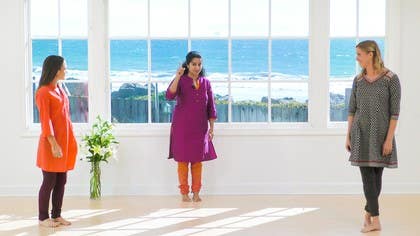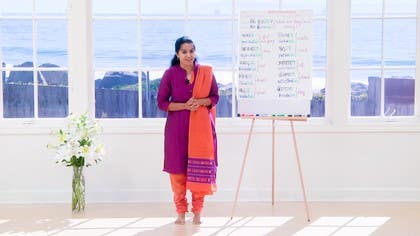Description
About This Video
Transcript
Read Full Transcript
Swagatam! Welcome! So, this is exciting because we are gradually discovering the verbs of the Sanskrit language. In our previous show, we looked at the conjugation of the verb in the third-person singular presentence. Remember, the verb has to tell you who is doing it, how many are doing it, and when they are doing it. So, what we will do next is we will look at, you guessed it, what two of them will do. As in our previous lessons, we have already been aware of the fact that in Sanskrit there is a singular dual and a plural and that has to do with the philosophy of the language where one person doing things makes sense but the couple is a unique unit. So, the two people doing it and then we have many creation, many doing something. So, right now we have two people who will do the same actions that we saw in the previous session. Just pay attention to the ending of the verb and that will give you the answer. It's really the key to knowing who's doing it. All right, there we go. So, the two of them go. Gatchataha! Okay, Alana, would you like to go from there to there please? So, Alana, Gatchati, one person, Gatchati. And now I will tell both of them to go across. Gatchataha, Gatchataha. Come towards me. So, come, two of them, come. Aa Gatchataha, Aa Gatchataha, would you like to go again? Gatchataha and Aa Gatchataha. Lovely. Now, let's see you have a nice meal together. The two of them eat.
Oh, they are enjoying the meal. Say that. It's a good idea if you have the two in your head. All right. So, lovely. Drink. Always more fun to drink in company. So, when the two of them do that. Pibbataha, Pibbataha. Okay, Alana drinking alone. Alana, Pibbati. Nicole alone. Pibbati. You see, they don't look half as happy. Together?
Pibbataha. Yeah, actions done together, definitely more fun. So, Pibbataha. Great. Now, talk to each other. So, speak. Vada Taha, Vada Taha. If just one person speaks, it would be very good. Vada Thi. Two of them, Vada Taha. Lovely. They're having a great time. All right. Now, the next one. You've had all the fun. Now, we've got to do some serious work. So, write. If the verb is Lik, it would be Lika Taha. You got it. Lika Taha. Alana and Nicole, Lika Taha. Very nice. Read. Pata Taha, Pata Taha. The two of them, Pata Taha. One person, Pata Thi. Another joins in and it becomes Pata Taha. Fantastic. Great. The next one is, both of you can sit down now. Done a lot of hard work. So, Opa Visha Taha. Opa Visha Taha.
If they stand up, when it was singular, it was Otesh Tati. Now, both of them would be Otesh Taha. Say it. Otesh Taha. We'll repeat that. It's a little longer sequence of syllables. So, just Alana sit down and you say what she's doing. Opa Visha Thi. Right. Opa Visha Thi. Nicole, will you join her? Opa Visha Thi. Now, that both of them are seated, it becomes Opa Visha Tha. Alana, Nicole, Opa Visha Tha. Alana, get up. Otesh Tati. Otesh Tati. And together, Otesh Taha. Say that. Otesh Taha. Lovely. Now, can you both play a game? What would you like to play? All right. So, that is. That was excellent. Really enjoyed it.
Thank you very much. Thank you. So, our two pretty models have done a brilliant job of conveying how the dual form works. But what we'll do is to revise the verbs once again. And also, I'd like to mention that the question for the singular was Kim Karoti. So, Alana, Kim Karoti. And the answer was Gatchati. Now, we have two of them, Alana and Nicole. The question would be Kim Kuru Taha. What are they doing? What are the two of them doing? Kim Kuru Taha. If they were going, it would be Gatchat Taha. If it was coming, Ah, Gatchat Taha. So, we'll play the game. I'll tell you the singular form. And as they demonstrate to us, you tell us what the dual form will be like. All right. There we go. So, Kadati Taha. You said Kadat Taha? Very good. Next one. Pibhati. Pibhataha. Excellent. Next, speaks Vadati. Very nice. Vadataha writes. So, Likhati in the singular and very good. Likhataha. Reans. Padhati.
Padhataha. Very nice. Now, when one person sits, it's Upavishati. The two of them. Very nice. Upavishataha stands. So, Alana stands. Uttishtati. When Nicole joins her, together. Very nice. Uttishtataha. And to play whatever game you'd like to. In the singular, it is Kreedati. And when they're playing together, they like the leapfrog. Kreedataha. Say that. Very good. So, just to complete the section, we have the different pronouns which are for the masculine. Tau. Gatchataha. For the feminine. Te Gatchataha. For the neuter, two of them. Te Gatchataha. And then when we have the formal you, it'll be Bhavantau for two of them. Gatchataha. And for the feminine. Bhavatiao. Play. Kreedataha or Gatchataha. Very good. So, I hope you are there with me still. Practice. But so long as you are able to start recognizing the patterns. Recognize the patterns. Open your soul to hear the sound. Recognize the patterns.
Once you can hear the patterns, it will be no difficulty remembering the patterns. If you try only to read it and look at it the way it's normally done, it becomes a far more tedious job. So, practice Gatchati, Khadati. You know, in your family when somebody's doing something, see if a Sanskrit word pops up at that point saying somebody's going. Gatchati. Or if there are two of them. Gatchataha. Give that a try. See what it feels like. And I'm always available. You can share your comments and I'll be there to answer it. Thank you. Thank you very much for being on the show.
Mother Tongue: Verbs
Comments
You need to be a subscriber to post a comment.
Please Log In or Create an Account to start your free trial.










